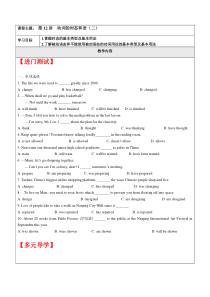 DOC
DOC
【文档说明】第二章第12讲-动词的时态和语态 (二)-学案.docx,共(16)页,233.119 KB,由管理员店铺上传
转载请保留链接:https://www.doc5u.com/view-0c9a43a31a30eb1779237ff916ae2d3a.html
以下为本文档部分文字说明:
课程主题:第12讲动词的时态和语(二)学习目标1.掌握时态的基本类型及基本用法2.了解被动语态和不能使用被动语态的动词用法的基本类型及基本用法教学内容【进门测试】一、单项选择1.Thelifewewereusedto______greatlysince2000.A.c
hangeB.haschangedC.changingD.changed2.—Whenshallwegoandplaybasketball?—Notuntilthework_______tomorrow.A.willfinishB.havefinishedC.
willbefinishedD.isfinished3.—Tom,Itoldyouhowtosolvethemathprobleminthelastlesson.—I’msorry,Mr.Lin.I___
___abouttheplanfortheclasstrip.A.thinkB.thoughtC.wasthinkingD.havethought4.Keepquiet,please!Youmustknowtalkingloudl
y________inthereadingroom.A.isnotallowedB.isallowedC.doesn’tallowD.allows5.Nexttermonethousandjuniorh
ighschoolgraduates______aspilotsinChina.A.trainB.willtrainC.willbetrainedD.havebeentrained6.—Mum,let’sgoshoppingtogether.—Can’ty
ouseeI’msobusy,dear?I______tomorrow’smeeting.A.prepareB.ampreparingC.waspreparingD.haveprepared7.Taobao,China’sbiggestonlineshoppingplatform
,_______thewaysChinesepeopleshopandlive.A.changesB.changedC.haschangedD.waschanging8.ToliveonMars,youneedtowea
rbootswhich________topreventyoufromfloatingoffintospace.A.designB.designedC.aredesigningD.aredesigned9.Lotsof
peopleliketotakeawalkonNanjingCityWallsinceit_______.A.repairedB.wasrepairedC.hasrepairedD.isrepaired10.About20worksfromPab
loPicasso(毕加索)______tothepublicattheNanjingInternationalArtFestivalinSeptemberthisyear.A.wasshownB.wereshownC.areshownD.willbeshown【多元导学】班级
一同学是个金庸迷,上中学的时候,一次英语课上他看《笑傲江湖》入了迷,忽然听闻老师讲“八大时态”,忙站起来纠正说:“老师,没那么多师太呀,只有三位,莫非你把小师妹也算进去了?”【互动精讲】【知识梳理1】整体知识体
系一般现在时:谓语动词用原形或第三人称单数一般过去时:谓语用动词的过去时一般将来时:谓语用will/shall/begoingto+动词原形现在进行时:谓语用am/is/are+动词的现在分词现在完成时:谓语用have/has+动词的过去分词过去进行时:谓语用w
as/were+动词的现在分词被动语态主动语态中考说明指出:一般现在时一般过去时动词时态动词语态一般将来时现在进行时过去进行时现在完成时【知识梳理2】考点剖析种类谓语形式用法be动词的一般现在时行为动词及其他连系动词的一般现在时is,am
,are+表语,根据人称而定表示现在的状态。1.动词原形2.主语是单数第三人称,谓语加-s,-es1.表示经常性或习惯性发生的动作;2.描述客观真理、客观存在或科学事实等;3.在时间、条件状语从句中,用一般现在
时表将来。be动词的一般过去时行为动词及其他连系动词的一般过去时was/were+表语1.表示过去存在的状态;2.表示过去经常存在的状态。动词的过去式1.表示过去发生的动作;2.表示过去经常发生的动作。现在进行时am/is/are+动词的现在分词1.表示说话时或目前正在进行的动作;2.与a
lways,usually等词连用,表示赞扬、厌恶或不满的情绪。过去进行时was/were+动词的现在分词表示过去某个时刻或某段时间正在进行的动作。一般将来时1.will/shall+动词原形2.begoingto+动词原形3.be+位移v.-ing1.bego
ingto表示根据主观判断将来肯定要发生的事情,will表示客观上将来势必发生的事情。主语可以是人,也可以是物;2.在含有时间、条件状语从句的复合句中,主句是一般将来时,从句用一般现在时来代替将来时;3.一些表示位移的动词,如go,come,leave,arriv
e,fly,start,move等,常用现在进行时表示将来时。现在完成时have/has+动词的过去分词1.表示过去发生的动作对现在造成的影响和结果;2.表示动作从过去开始一直持续到现在,并有可能继续下去,
常与“for+时间段”或“since+表示六种时态过去的时间点或时间段”连用;注意:终止性动词在现在完成时中不能和表示一段时间的状语连用,但在否定句中可以和一段时间连用。【知识梳理3】时态精讲一、一般将来时用法例句1.表示在将来某个时间将要发生的动作或存在的状态。常与tomorrow,soo
n,later,nexttime,in+一段时间等连用。I’llstarttomorrow.我明天动身。2.“begoingto+动词原形”用于表示主观上打算将来要做某事,这种打算往往是事先安排好的或表示可能要发生或
肯定要发生的事情。Shehasboughtsomeclothandsheisgoingtomakeherselfadress.她买了一些布,准备为自己做一件连衣裙。3.“be+doing”表示按计划安排好的事情,常与少量表示
位置移动的动词,如go,come,start,move,leave等连用。I’mleavingforBeijingtomorrow.明天我就要动身去北京了。4.在表示车、船、飞机等的进出时间时,可以用一般现在时表示将来。Myplanetakeso
ffat6:30am.我乘坐的飞机将在早上6:30起飞。【巧学妙记】一般将来时,将要发生事。谓语不一般,will加动原。要变一般疑问句,will放在主语前。否定句也不难,will后面not添。【例题精讲】例1.TheGamesofToky
oOlympic_____in2020.A.washeldB.isheldC.willholdD.willbeheld例2.—It’ssaidtheNanjingAirportlightrail________
_intoserviceintwomonths.—That’sgreat!Itwillbefasttogototheairport.A.putsB.willputC.isputD.willbeput二、现在完成时用法例句1.表示说话之前已经完成
了的动作,而且这个动作对现在仍有影响,常与already,yet,inthepastfewyears等时间状语连用。Ihaveseenthefilmalready.我已经看过这部电影了。(已知电影内容)2.表示过去已经开始,持续到现在的动作或状态,常与
bynow,sofar,since/for等时间状语连用。Ihavestudiedintheschoolsince2009.自从2009年我就在这所学校学习。【巧学妙记】英语现在完成时,谓语结构要牢记;“have/has+过去分词”主要用法有两个;动作发生在过去,结果影响
到现在;常用just,already,过去的动作或状态;一直延续到现在,for和since把时间带。批注:1.have/hasbeento,have/hasgoneto,have/hasbeenin的区别(1)have/hasbeento:
曾经去过,强调以往的经历。例:TheoldmanhasbeentoEgyptwhenhewasyoung.(2)have/hasgoneto:去了某地,强调还没有回来。例:--Whereisyouruncle?--Hehasgonetothesupermarket.(3)have/hasbeen
in:待在某地,住在某地。例:IhavebeeninNanjingforthreeyears.2.for和since的区别(1)since的用法A.since后可加时间点,如:Ithasbeennineyearssince1987.B.since引导时间状语从句时,后面的时间
状语从句动词用一般过去时,主句动词用现在完成时(2)for的用法:for后加一段时间。如:Theyhaveworkedinthefactoryfortenmonths.(3)since和for用法的相互转换:for+一段时间=since+一段时间+ago(4)对since和for的提
问用howlong。如:—HowlonghaveyoubeeninNanjing?—Forthreeyears./Sincethreeyearsago.【例题精讲】用for,since,ago填空。1.Sallyh
asbeenawayfromLondon________lastSaturday.2.Ourschoolhaschangedalot________thenewbuildingwasbuilt.3.Tommyhashadthismotorcycle________t
hreeyears.4.IhavebeeninNanjing________eightyears.5.Myparentshasbeenmarriedsincetwentyyears________.【课堂练习】例1.—Whyareyouworried?—I’mexpectinga
callfrommydaughter.She______NewYorkforthreeyears.A.hasgonetoB.hasbeentoC.hasbeeninD.hascomein例2.Myfath
er_________toSouthHill.He______therefor5days.A.hasgone;hasbeenB.hasbeen;hasgoneC.hasgone;hasgoneD.hasbeen;hasbeen3.非延续性动词和延续性动词【例题精讲】例1.AliceinWon
derland________for15daysandmanyofuslikethefilmverymuch.A.beginsB.hasbegunC.beganDhasbeenon例2.—Doyoumissyourparentfaraway?非延续性动词延续性动词buyhaveborrow
keepopenbeopenclosebeclosedbegin/startbeoncomebeheregobetherefinish/endbeoverdiebedeadjoinbein/beamemberofleavebeawayfromarriv
e/reachbeheregetmarriedbemarried—Yes,verymuch.They__________thehometownforovertwoyears.A.leftB.haveleftC.wereawayfromD.havebeenawayfrom4.一
般过去时和现在完成时的区别区别例句一般过去时表示过去某时发生的动作或单纯的叙述过去发生的事情,强调过去,与具体的表示过去的时间连用。TomlivedinBeijingtwoyearsago.两年前汤姆住在北京。(不知道现在是否还住在北京)现在完
成时的动作虽然是发生在过去,但是对现在有影响。TomhaslivedinBeijingfortwoyears.汤姆住在北京两年了。(现在汤姆还在北京)【例题精讲】例1.Julie’sfather________toLondonlastmonth.He________therethreet
imes.A.went;hadgoneB.hasgone;hasbeenC.went;hasbeenD.hasbeen;hadgone例2.—Howlonghaveyou____here?—Fortwodays.I_____herethedaybeforey
esterday.A.been;cameB.come;cameC.came;cameD.been;been【巩固练习】1.Mikeusedtobeatopstudent,buthe_______behindsincehe
losthimselfincomputergames.A.fellB.hasfallenC.wasD.hasbeen2.—Whyareyoustillhere?It’salmosteighto’clock.—BecauseI_______(notfi
nish)mywork.3.—Excuseme,canIborrowtheRobotmagazine?—Sorry.Sandy_______itforaweek.A.keptB.haskeptC.bor
rowedD.hasborrowed三、过去进行时用法例句1.表示过去的某一时刻正在发生的动作。Iwasreadinginthelibraryatthistimeyesterday.昨天的这个时候我正在图书馆看书。2.表示
过去一段时间内正在进行的动作。Theywerehavingameetingfrom2:00to4:00yesterdayafternoon.昨天下午2:00-4:00的那个时候我们正在开会。3.过去进行时常与always等频度副词连用,表示
过去频繁发生的习惯动作,此时的过去进行时带有一定的感情色彩。Jackwasalwayschanginghismind.杰克总是改变他的想法。4.go,come,leave,arrive,start等动词,其过去进行时表示过去按计划即将发生的动作。Iwasleav
ingwhenhecamein.我正要离开时他进来了。现在进行时和过去进行时的区别区别例句现在进行时与现在的时间有关。当时间状语为now,atthemoment,thesedays等或当句子中含有look,listen,canyousee,can’tyousee之类的暗示词时,要用现在进行时。
①Listen!Lilyissingingintheclassroom.听!Lily正在教室唱歌呢。②Can’tyouseetheyaredoingtheirhomework?你难道没有看见他们正在做家庭作业吗?过去进行时与过去的时
间有关。与过去进行时连用的时间状语:atthistimeyesterday,atthattime,then,attenlastnight,from...to...,thedaybeforeyesterday,thosedays等。IwaswatchingTVatthistimeyester
day.昨天的这个时候我正在看电视呢。【例题精讲】例1.—Hi.Ididn'tseeyouatthepartyinthecompanyyesterdayevening.—Oh,allmyfamily__
_____myson'sbirthdayathome.A.celebratedB.havecelebratedC.wascelebratingD.werecelebrating例2.—DidyouseeBettyjustnow?—Yes.She_____s
omeone,soInoddedtoherandwentaway.A.phonedB.isphoningC.wasphoningD.hasphoned【知识梳理4】各种时态的主动被动语态一览表时态主动语态被动语态主动语态被动语态一
般现在时do/doesis/am/are+doneIclosethedoor.Thedoorisclosed.一般过去时didwas/were+doneTimmadethepaperbag.ThepaperbagwasmadebyTim.一般
将来时will/shall+dowill/shall+bedoneTheywillbuildanewlibraryinourschool.Thenewlibrarywillbebuiltinourschool.现在进行时am/is/are+doingam/is/are+beingdoneTh
eyarecleaningtheroom.Theroomisbeingcleanedbythem.现在完成时have/has+donehave/has+beendoneIhaven’tfoundmyMypursehasn’t
beenpurse.found.过去进行时was/were+doingwas/were+beingdoneKimwasrepairingthebicycle.Thebicyclewasbeingrepairedb
yKim.含情态动词can/may/must+docan/may/must+bedoneWecanfinishthisproject.Thisprojectcanbefinishedbyus.批注:1.不用于被动语态的情况(1)不及物动词不用于被动语态,如ap
pear,rise,comeout,happen,occur,lie,takeplace等不及物动词不能用于被动语态。(2)表状态动词不用于被动语态,常见的有:hold,have,cost,contain,become,looklike等。2.主动形式表被动含义(
1)某些感官动词和系动词接形容词可以表示被动意义。(2)某些作表语的形容词后,用不定式主动形式表示被动意义。(3)need,require,want等作行为动词时,“need/want/require+doing”表被动,等同于“need/want/re
quire+tobedone”结构。(4)write,sell,wash和read和副词连用,主动语态表被动意义。【例题精讲】例1.Youcan'tusethecomputer,it____.A.wasbrokendownB.brokedownC.iswrongD.hasbrokend
own例2.Theapple_________verysweet.A.istastedB.tasteC.tastesD.aretasting例3.Thelibraryneeds_______,butitwillhavetowaituntilSunday.A.cleaningB.becle
anedC.cleanD.beingcleaned3.主动变被动中的特殊结构主动形式被动形式see/hearsb.dosth.beseen/heardtodosth.see/hearsb.doingsth.beseen/hearddoingsth.makesb.dosth.bemadetodo
sth.使役动词see,hear,make,let等在主动语态中常跟不带to的动词不定式做宾语补足语,但转变成被动语态时,to要还原。【巧学妙记】一感:feel二听:hear,listento三让:let,make
,have四看:see,watch,notice,lookat【例题精讲】例1.Theboy________streetswithoutpayintheolddays.A.wasmadetocleanB.madecl
eanC.madetocleanD.wasmadeclean例2.Thesechildren_________dance.A.wereseentoB.wereseenforC.wereseenD.sawto【巩固练习】1.LeonardoDi
Caprio_______anOscarforBestActorforhisroleinthefilmTheRevenantinJanuary,2016.A.presentsB.haspresentedC.presentedD.wa
spresented2.I’mgladtoknowthatNanjingMetroLine14_______nextyear.A.isbuiltB.wasbuiltC.willbebuiltD.Built3.TheApril25disasterinNepalis______(repo
rt)tohavetakenthelivesofmorethan8,000people,withmorethan16,000injured.4.NanjingInternationalPlumBlossomFestival______betweenF
ebruaryandMarcheveryyear.heldB.isheldC.washeldD.willbeheld5.—It’ssaidthattheprojectwearelookingforwardto______ou
tinourschoolthisweekend.—Great!Ican’twaittotakepartinit!A.willbecarriedB.willcarryC.beingcarriedD.carry
ing【课堂检测】一、单项选择1.—Whendidtheclassroomhaveapowercut?—Thismorning,whilewe______aphysicslesson.A.havehadB.werehavingC.arehavin
gD.willhave2.—ThefilmDangal__inourcitylastmonthandwonhighpraise.—Exactly.Ihaveseenittwice.A.wasshownB.willshowC.iss
hownD.hasshown3.—Excuseme,whattimedoesFlightBA2793leave?—Justaminute.I_____foryouA.checkB.checkedC.willcheckD.havec
hecked4.—Whyhasn'tTonycome?—Theinvitationletter_toTobybyaccident.A.wasemailedB.hasemailedC.isemailedD.emailed5.Theypromisedthattheymelookformykey
untilitwasfound.Buttheysoonwalkedaway.A.willhelpB.havehelpedC.wouldhelpD.hadhelped6.Theshoppingmall______fortwoyears,butI______the
reonlyonce.A.hasopened;havegoneB.hasopened;havebeenC.hasbeenopen;havegoneD.hasbeenopen;havebeen7.—Youhaveanicecar.—Thankyou.I____
_itforlessthanonemonth.A.boughtB.haveboughtC.hadD.havehad8.Itisreportedthatabout120foreignsoccerexperts______toteachso
ccerschoolstudents.A.inviteB.invitedC.tobeinvitedD.willbeinvited9.Mybrother______theIndianfilmDangalwhe
nIphonedhimyesterday.A.watchesB.haswatchedC.iswatchingD.waswatching10.Mygrandparents______forover60yearsandtheyloveeachot
herverymuch.A.havebeenmarriedB.gotmarriedC.weremarriedD.havegotmarried111.Ifit______tomorrow,we’llgoroller-skatin
g.A.isn’trainB.won’trainC.doesn’trainD.doesn’tfine12.—MayIspeaktotheheadmaster?—He_____ameetingnow.CanItake
amessage?A.ishavingB.hadC.hasD.willhave13.—Julie,what_____inyourhand?—Look!It’sanewiPadformydaughter.A.doyouholdB.areyouholdingC.
wereyouholdingD.willyouhold14.—Icalledyouyesterdayevening,butyouwerenotin.—sorry,I_____intheshopwithmymother.A.amB.willbeC.wasD.h
avebeen15.—Mr.Li,let’sgofishingthisweekendwithLaoWang,shallwe?—I’dloveto,butnobodyknowsifhe_____freethen.A.willB.isC.willbeD.hasbee
n16.—Whereisyourcousin?—He_____anEnglishexamnow.A.hasB.hadC.hashadD.ishaving17.—Haveyouhadyourbreakfastyet?—Yes.Mom_____itforme.A.wascookingB.isco
okingC.willcookD.cooked18.—Sam,comedownstairs,please.Ineedyourhelp.—Sorry,mum.I_____onthephone.A.amtalkingB.talkedC.wastalkingD.havetalk
ed19.Ifthereisanychangetotheplan,I_____youassoonaspossible.A.toldB.havetoldC.tellD.willtell20.—Wendy,canyouanswerthephoneformenow?Myhands
arefull.—Sorry,______.A.IwashedtheclothesB.I’mwashingtheclothesC.IwaswashingtheclothesD.Ihavewashedtheclothes21.—Let
'sdiscusstheplan,shallwe?—Notnow.I_____toaninterview.A.goB.wentC.amgoingD.wasgoing22.There_____ameetingtomorrowafternoon.A.willbegoingt
oB.willgoingtobeC.isgoingtobeD.willgotobe23.—Alice,wouldyoumindnotplayingtheguitar?Ionthephone.—Oh,sorry,mom.A.talkedB.talkC.wastalkingD.amta
lking24.You__.Don’ttalkonthephone.A.willdriveB.aredrivingC.weredrivingD.havedriven25.—Ican’tfindDavid.Whereishe?—He_____
fortomorrow’scompetitionsathome.A.preparesB.ispreparingC.haspreparedD.prepared二、完形填空Intheearlyhoursof7September1838,oneoftheworstst
ormsinhistorywasroaring(咆哮)alongthecoastofEngland.Thelighthousekeeperataship.“Itwillbegoneinafewmoreminutes,”hesaidsadly.Hisdaughter,GraceDarling
,lookingfromanupstairswindow,foundthegreatshiphadagainsttherocksandbrokenintohalves.“Can’twesavethem?”Graceaskedwhenshe
sawthepeopleontheship.“Isn’tthereanywaytohelpthem?”“Noonecantakealifeboatoutinthatwater,”herfatheranswered.“Thewaves(浪)are
toolarge.”Gracehadgreat.Shesimplydidnotknowhowtogiveup.Filledwithpity,sherantothelifeboatquickly.Herfather.Withtearsrunningdownhisface,hebeggedhis
daughternottogetintotheboat,shewouldnotlisten.Herfathercouldnotlethergoalone.Heclimbedintoo.Thetwoofthemrowedinagreathurry.Eachwaveseemedtothrowt
hemintotheseaatanytime.Suddenlytherewasaterribleroar.Thestormhadtheshipintwo.Peoplewereholdingontoeachhalftightly(紧紧地).Theyhadtobesavedsoon.Gracea
ndherfatherrowedfaster.Soontheyreachedtheshipandbeganfillingthelifeboatwith.Thenfatheranddaughterbroughtth
eirlifeboatsafelytoshore.Asnewsofherbravesavingactionreachedthepublic,thewholecountryconsideredherasanationalhero.GraceandherfatherreceivedtheSilver
MedalfromtheBritishgovernment.Tothisdayasmallstatuestandsabovethegrave(墓)ofGraceDarling.Peoplestillrespecttheyoungwomanwhorefusedtogi
veup.()1.A.lookedoutB.lookedupC.lookedaroundD.lookeddown()2.A.ranB.knockedC.crashedD.rushed()3.A.worriedB.scaredC.excit
edD.mixed()4.A.prideB.attentionC.confidenceD.courage()5.A.stayedB.pushedC.followedD.returned()6.A.butB.andC.soD.th
en()7.A.madB.closeC.awfulD.ready()8.A.dividedB.cutC.liftedD.attacked()9.A.adultsB.touristsC.victimsD.survivors()10.A.awardB.giftC.prizeD.reward【
要点回顾】六种时态总结种类谓语形式用法be动词的一般现在时行为动词及其他连系动词的一般现在时is,am,are+表语,根据人称而定表示现在的状态。1.动词原形2.主语是单数第三人称,谓语加-s,-es1.表示经常性或习惯性发生的动作;2.描述客观真理、客观存在或科学事实等;
3.在时间、条件状语从句中,用一般现在时表将来。be动词的一般过去时行为动词及其他连系动词的一般过去时was/were+表语1.表示过去存在的状态;2.表示过去经常存在的状态。动词的过去式1.表示过去发生的动作;2.表示过去经常发生的动作
。现在进行时am/is/are+动词的现在分词1.表示说话时或目前正在进行的动作;2.与always,usually等词连用,表示赞扬、厌恶或不满的情绪。过去进行时was/were+动词的现在分词表示过去某个时刻或某段时
间正在进行的动作。一般将来时1.will/shall+动词原形2.begoingto+动词原形3.be+位移v.-ing1.begoingto表示根据主观判断将来肯定要发生的事情,will表示客观上将来势必发生的事情。主语可以是人,也可以是物
;2.在含有时间、条件状语从句的复合句中,主句是一般将来时,从句用一般现在时来代替将来时;3.一些表示位移的动词,如go,come,leave,arrive,fly,start,move等,常用现在进行时表示将来时
。现在完成时have/has+动词的过去分词1.表示过去发生的动作对现在造成的影响和结果;2.表示动作从过去开始一直持续到现在,并有可能继续下去,常与“for+时间段”或“since+表示过去的时间点或时间段”连用;注意:终止性动词在现在完成时中不能和表示
一段时间的状语连用,但在否定句中可以和一段时间连用。【温故知新】课后巩固首字母填空Puttingonaplaycanbefun.Actingcanbelikethe“let’spretendanddress-upgameschildrenplay.Actorsp
retend(扮演),foralittlewhile,tobeotherpeople.They1.ttolooklikeandtalkasotherpersonsdo.Professional(职业的)actorstakepartinplaysandtelevisionprog
ramsgiveninlargecities.Theymaketheir2.lbyacting.Butotherpeopleactinplaysjustforfunandarenot3.pfortheirwork.Th
eyarehighschoolorcollegestudentsandadultswhoaremembersof“littletheatre”groups.Inthe4.d,theyarestudents,teachers,doctors,lawyers,orpoliceofficers.Th
eyareactors5.ointheeveningsoronweekends.ThelittletheatergroupshasalonghistoryinAmerica.Oneofthe6.ogroupsisinIndiana.TheyarecalledthePlayersClub,a
ndtheyputoneightplaysayear.Peopleinthecitybuyticketstoseetheplays.7.A____whowantstoactmayjointhePlayersClub.Befor
eeachplay,auditions(试演)areheldsothatpeoplecantry8.o_______forthedifferentparts.Notallmembersofthegroupareactors.Peoplearealsone
ededto9.h_____withthelighting,clothesandmakeup.Therearelittletheatergroupsinmanycities.Theycontinuetoputonplaysbecausethey
bring10.p____toalargenumberofpeople.Peopleinalittletheatergroupenjoyhavingthechancetoact,andtheaudien
ceenjoywatchingtheplays.预习思考ThreelinesofpoetLookatthepicture!Whatabeautifulscene!It’sbeautiful,isn’tit?Writedownyourthreelinesofpoet获得更多资源请扫码加
入享学资源网微信公众号www.xiangxue100.com